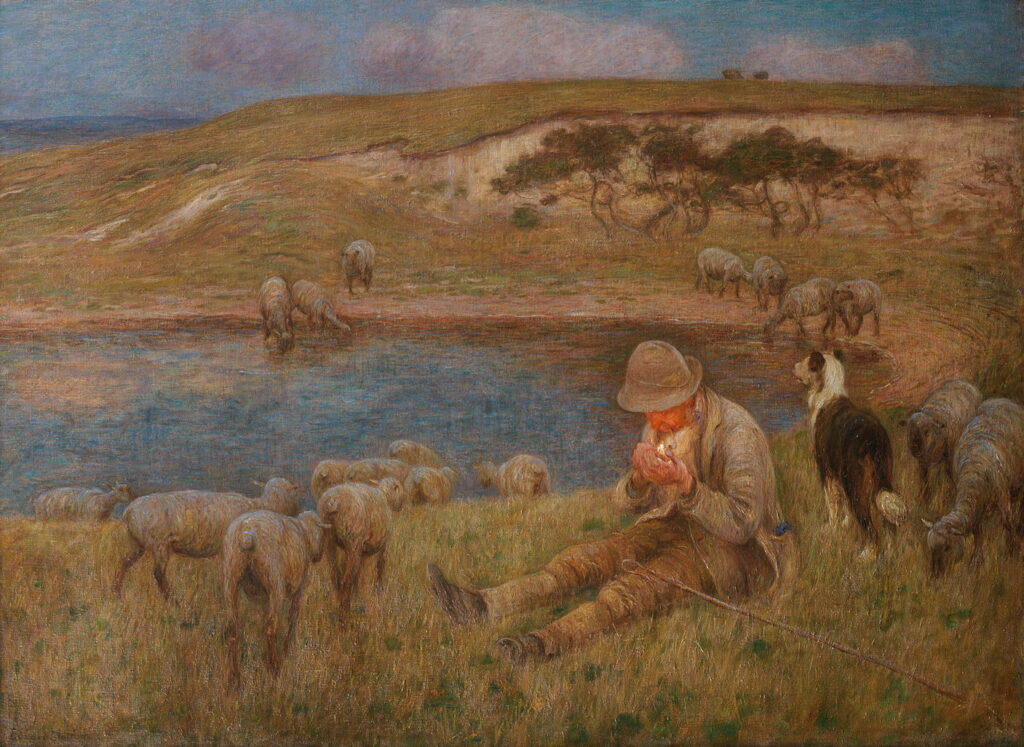The Real Country: Idyll

Ask anyone who has lived in the country and they’ll recall its idyllic moments. To end this series, I celebrate a few of those in paintings from the turn of the nineteenth to twentieth centuries.
Mykola Kuznetsov (1850-1929), In Celebration (1879-81), oil on canvas, 55 x 98 cm, Tretyakov Gallery Государственная Третьяковская галерея, Moscow, Russia. Wikimedia Commons.
This Ukrainian farm labourer is caught relaxing for a moment in the sun and flowers of early summer in Mykola Kuznetsov’s early In Celebration (1879-81).
Giovanni Segantini (1858–1899), Ploughing (1890), oil on canvas, 117.6 x 227 cm, Neue Pinakothek, Munich, Germany. Image © Ad Meskens, via Wikimedia Commons.
The pair of ploughmen in Giovanni Segantini’s Ploughing may not have had time to study the fine mountain views near the Alpine village of Savognin, but they and the other labourers in the right distance are enjoying the fine weather.
Giovanni Segantini (1858–1899), High Noon in the Alps (1892), oil on canvas, 86 x 80 cm, Ohara Museum of Art 大原美術館, Kurashiki, Japan. Wikimedia Commons.
A couple of years later, Segantini’s High Noon in the Alps (1892) catches this shepherdess enjoying a brief break in her work, in the intense summer sunshine of the high plateau.
Pascal Dagnan-Bouveret (1852–1929), In the Forest (1893), oil on canvas, dimensions not known, Musée des beaux-arts de Nancy, Nancy, France. Image by G.Garitan, via Wikimedia Commons.
Pascal Dagnan-Bouveret shows that even itinerant workers could sit together and eat to the music of a violin when living In the Forest in 1893. Behind them are two oxen, and the forest that’s currently their home.
Teodor Axentowicz (1859–1938), Kołomyjka, Oberek Taniec ludowy przed domem (Oberek Folk Dance in Front of a House) (1895), oil on canvas, 85 x 112.5 cm, Muzeum Narodowe w Warszawie, Warsaw, Poland. Wikimedia Commons.
In Poland, Teodor Axentowicz’s painting of Oberek Folk Dance in Front of a House from 1895 shows locals dancing the second most popular Polish folk dance after the polka. Most of these dancers are barefoot.
Edward Stott (1855–1918), Peaceful Rest (c 1902), oil on canvas, 60.5 x 81 cm, Private collection. Wikimedia Commons.
Edward Stott’s shepherd has stolen a moment of Peaceful Rest as his small flock drinks from a pond. He’s lighting a clay tobacco pipe, with his crook resting on his leg. Most of the painting uses a limited palette, with three splashes of colour standing out: the man’s face lit by the flame, the watchful sheepdog behind him, and a blue object protruding from the man’s jacket pocket.
Jules Bastien-Lepage (1848–1884), Love in the Village (1882), oil on canvas, 194 × 180 cm, Pushkin Museum of Fine Arts Музей изобразительных искусств им. А.С. Пушкина, Moscow, Russia. Wikimedia Commons.
Jules Bastien-Lepage’s Love in the Village shows a young couple on either side of a tumbledown fence, chatting intimately among the vegetable patches.
Idyllic moments indeed, but what happens in the country is often a far cry from the town.
Nikolai Astrup (1880–1928), Fjøsfrieri (Early Courting) (1904), oil, dimensions not known, Private collection. Wikimedia Commons.
Nikolai Astrup’s humorous painting of Early Courting from 1904 shows a young couple at the far left engaged in ‘clothed courting’ in the unromantic surroundings of a cowshed. He has a bottle of drink in his pocket; whether that’s to give him courage or to weaken the resistance of his girlfriend is unclear.
The couple have sought the privacy of the cowshed, out of everyone’s way, but the boyfriend appears unaware that they’re being watched by someone up in the roof. From the apparent direction of gaze of the girlfriend and the blush on her cheeks, she has just noticed the peeping tom or watchful relative. The setting is enhanced by the sunlight pouring through the far window, illuminating two rows of the back-ends of cows. The wood floor between the cows appears to be decorated with small sketches, but those are actually piles of cow dung. Courting in the country must have been a sensorily rich experience.




